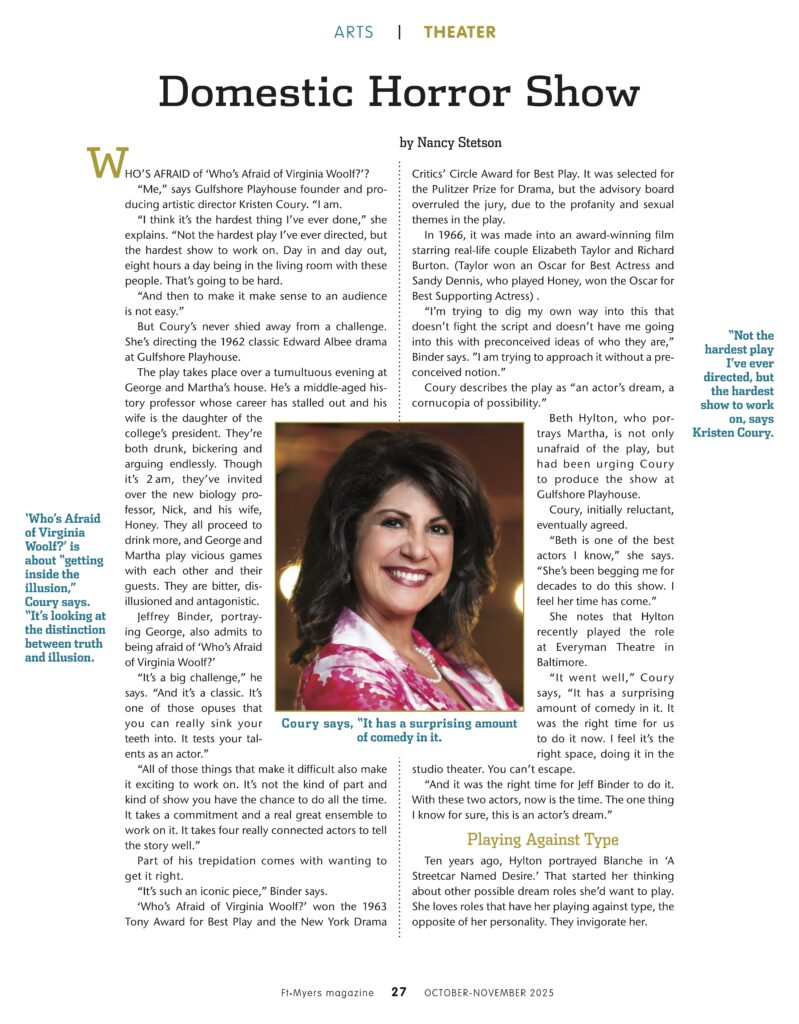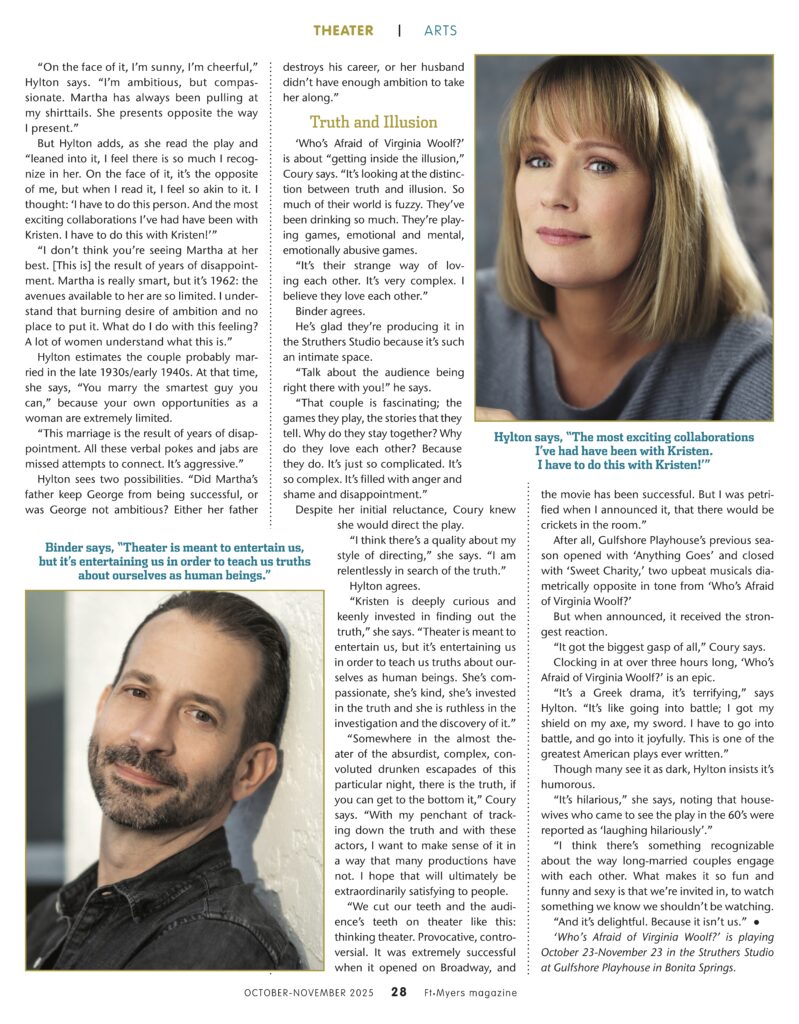Fort Myers Magazine’s Nancy Stetson on Who’s Afraid of Virginia Woolf?
Domestic Horror Show
by Nancy Stetson
WHO’S AFRAID of ‘Who’s Afraid of Virginia Woolf?’?
“Me,” says Gulfshore Playhouse founder and producing artistic director Kristen Coury. “I am.
“I think it’s the hardest thing I’ve ever done,” she explains. “Not the hardest play I’ve ever directed, but the hardest show to work on. Day in and day out, eight hours a day being in the living room with these people. That’s going to be heard.
“And then to make it make sense to an audience is not easy.”
But Coury’s never shied away from a challenge. She’s directing the 1962 classic Edward Albee drama at Gulfshore Playhouse.
The play takes place over a tumultuous evening at George and Martha’s house. He’s a middle-aged history professor whose career has stalled out and his wife is the daughter of the
college’s president. They’re both drunk, bickering and arguing endlessly. Though it’s 2 am, they’ve invited over the new biology professor, Nick, and his wife, Honey. They all proceed to drink more, and George and Martha play vicious games with each other and their guests. They are bitter, disillusioned and antagonistic.
Jeffrey Binder, portraying George, also admits to being afraid of ‘Who’s Afraid of Virginia Woolf?’
“It’s a big challenge,” he says. “And it’s a classic. It’s one of those opuses that you can really sink your teeth into. It tests your talents as an actor.”
“All of those things that make it difficult also make it exciting to work on. It’s not the kind of part and kind of show you have the chance to do all the time. It takes a commitment and a real great ensemble to work on it. It takes four really connected actors to tell the story well.”
Part of his trepidation comes with wanting to get it right.
“It’s such an iconic piece,” Binder says.
‘Who’s Afraid of Virginia Woolf?’ won the 1963 Tony Award for Best Play and the New York Drama Critics’ Circle Award for Best Play. It was selected for the Pulitzer Prize for Drama, but the advisory board overruled the jury, due to the profanity and sexual themes in the play.
In 1966, it was made into an award-winning film starring real-life couple Elizabeth Taylor and Richard Burton. (Taylor won an Oscar for Best Actress and Sandy Dennis, who played Honey, won the Oscar for Best Supporting Actress) .
“I’m trying to dig my own way into this that doesn’t fight the script and doesn’t have me going into this with preconceived ideas of who they are,” Binder says. ”I am trying to approach it without a pre- conceived notion.”
Coury describes the play as “an actor’s dream, a cornucopia of possibility.”
Beth Hylton, who portrays Martha, is not only unafraid of the play, but had been urging Coury to produce the show at Gulfshore Playhouse.
Coury, initially reluctant, eventually agreed.
“Beth is one of the best actors I know,” she says. “She’s been begging me for decades to do this show. I feel her time has come.”
She notes that Hylton recently played the role at Everyman Theatre in Baltimore.
“It went well,” Coury says, “It has a surprising amount of comedy in it. It was the right time for us to do it now. I feel it’s the right space, doing it in the Studio theater. You can’t escape.
“And it was the right time for Jeff Binder to do it.
With these two actors, now is the time. The one thing I know for sure, this is an actor’s dream.”
Playing Against Type
Ten years ago, Hylton portrayed Blanche in ‘A Streetcar Named Desire.’ That started her thinking about other possible dream roles she’d want to play. She loves roles that have her playing against type, the opposite of her personality. They invigorate her.
“On the face of it, I’m sunny, I’m cheerful,” Hylton says. “I’m ambitious, but compassionate.
Martha has always been pulling at my shirttails. She presents opposite the way I present.”
But Hylton adds, as she read the play and “leaned into it, I feel there is so much I recog- nize in her. On the face of it, it’s the opposite of me, but when I read it, I feel so akin to it. I thought: ‘I have to do this person. And the most exciting collaborations I’ve had have been with Kristen. I have to do this with Kristen!’”
“I don’t think you’re seeing Martha at her best. [This is] the result of years of disappointment. Martha is really smart, but it’s 1962: the avenues available to her are so limited. I under- stand that burning desire of ambition and no place to put it. What do I do with this feeling? A lot of women understand what this is.”
Hylton estimates the couple probably mar- ried in the late 1930s/early 1940s. At that time, she says, “You marry the smartest guy you can,” because your own opportunities as a woman are extremely limited.
“This marriage is the result of years of disappointment. All these verbal pokes and jabs are missed attempts to connect. It’s aggressive.”
Hylton sees two possibilities. “Did Martha’s father keep George from being successful, or was George not ambitious? Either her father destroys his career, or her husband didn’t have enough ambition to take her along.”
Truth and Illusion
‘Who’s Afraid of Virginia Woolf?’ is about “getting inside the illusion,” Coury says. “It’s looking at the distinc- tion between truth and illusion. So much of their world is fuzzy. They’ve been drinking so much. They’re playing games, emotional and mental, emotionally abusive games.
“It’s their strange way of loving each other. It’s very complex. I believe they love each other.”
Binder agrees.
He’s glad they’re producing it in the Struthers Studio because it’s such an intimate space.
“Talk about the audience being right there with you!” he says.
“That couple is fascinating; the games they play, the stories that they tell. Why do they stay together? Why do they love each other? Because they do. It’s just so complicated. It’s so complex. It’s filled with anger and shame and disappointment.”
Despite her initial reluctance, Coury knew she would direct the play.
“I think there’s a quality about my style of directing,” she says. “I am relentlessly in search of the truth.”
Hylton agrees.
“Kristen is deeply curious and keenly invested in finding out the truth,” she says. “Theater is meant to entertain us, but it’s entertaining us in order to teach us truths about our- selves as human beings. She’s compassionate, she’s kind, she’s invested in the truth and she is ruthless in the investigation and the discovery of it.”
“Somewhere in the almost the- ater of the absurdist, complex, con- voluted drunken escapades of this particular night, there is the truth, if you can get to the bottom it,” Coury says. “With my penchant of track- ing down the truth and with these actors, I want to make sense of it in a way that many productions have not. I hope that will ultimately be extraordinarily satisfying to people.
“We cut our teeth and the audience’s teeth on theater like this: thinking theater. Provocative, controversial. It was extremely successful when it opened on Broadway, and
the movie has been successful. But I was petrified when I announced it, that there would be crickets in the room.”
After all, Gulfshore Playhouse’s previous sea- son opened with ‘Anything Goes’ and closed with ‘Sweet Charity,’ two upbeat musicals diametrically opposite in tone from ‘Who’s Afraid of Virginia Woolf?’
But when announced, it received the strongest reaction.
“It got the biggest gasp of all,” Coury says.
Clocking in at over three hours long, ‘Who’s Afraid of Virginia Woolf?’ is an epic.
“It’s a Greek drama, it’s terrifying,” says Hylton. “It’s like going into battle; I got my shield on my axe, my sword. I have to go into battle, and go into it joyfully. This is one of the greatest American plays ever written.”
Though many see it as dark, Hylton insists it’s humorous.
“It’s hilarious,” she says, noting that house- wives who came to see the play in the 60’s were reported as ‘laughing hilariously’.”
“I think there’s something recognizable about the way long-married couples engage with each other. What makes it so fun and funny and sexy is that we’re invited in, to watch something we know we shouldn’t be watching.
“And it’s delightful. Because it isn’t us.”
‘Who’s Afraid of Virginia Woolf?’ is playing October 23-November 23 in the Struthers Studio at Gulfshore Playhouse in Naples.


Make a Donation Today
You play a vital role. By supporting Gulfshore Playhouse, you are transforming a region and transforming lives.





